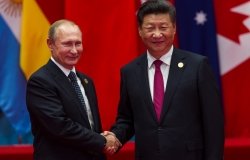Reinventing the Alliance
Summary of a meeting with Thomas Berger, Boston University; John Ikenberry, Georgetown University; Takashi Inoguchi, University of Tokyo; Michael Mastanduno, Dartmouth College; Jitsuo Tsuchiyama, Aoyama Gakuin University
Overview
Summary of a meeting with Thomas Berger, Boston University; John Ikenberry, Georgetown University; Takashi Inoguchi, University of Tokyo; Michael Mastanduno, Dartmouth College; Jitsuo Tsuchiyama, Aoyama Gakuin University
More than 100 people attended this seminar, which addressed the future of the US-Japan alliance. The panel tackled such questions as: How relevant today is an alliance originally designed to repel communist expansion? How can it be rendered more compatible with the multilateral impulses that are increasingly prevalent in the Asia-Pacific region?
Michael Mastanduno of Dartmouth College evaluated the alliance from the standpoint of alternative security arrangements. For example, he pointed out that while an "Asian NATO" may be desirable, it is hardly feasible in the absence of shared values and interests. The other two alternatives—a U.S. withdrawal and a Cold-War type containment of China—risk provoking an arms race. To call for continuation of the alliance, however, is not to suggest preserving it forever in its present form. Tadashi Inoguchi and John Ikenberry put forward the U.S.-Germany relationship as a good model to follow in the future. That is, Washington and Tokyo should seek to "embed" Japan more deeply in the Asia-Pacific region (at the same time solid bilateral ties are maintained). That is, bilateralism and multilateralism should not be seen as mutually exclusive alternatives. Such a strategy helped Germany overcome the suspicion of its neighbors, encouraged European stability and fueled regional prosperity.
Hostile neighbors are indeed a problem for Japan, as pointed out by Thomas Berger of Boston University. While many Japanese people acknowledge the suffering inflicted by their country's World War II aggression, the Japanese government is frequently accused of "historical amnesia." Berger urged all sides to recognize that any resolution of the history problem will be slow. Official overtures must be accompanied by grassroots exchange and widespread public consensus.
To describe the changing context of the Japan-U.S. alliance, Jitsuo Tsuchiyama used concepts borrowed from economics, such as the "bandwagonning effect." Just as economic goods (such as access to the Internet) become more useful as more people purchase them, alliances with the United States are increasingly perceived as indispensable. Thus, what the U.S. Department of Defense calls "security community building" is replacing the more exclusive hub-and-spokes system of the past.
In general, the members of the panel agreed that the alliance must "run to stay in place." That is, re-invention of the alliance is necessary to keep it as relevant as in past years. The alliance has become the mechanism that ties United States to Asia and Japan to the world. In the absence of a truly viable region-wide multilateral security arrangement, the alliance is the best bet for encouraging stable and peaceful interdependence.
Drafted by Amy McCreedy, Asia Program Associate, 202/691-4013
Robert M. Hathaway, Asia Program Director
Hosted By

Indo-Pacific Program
The Indo-Pacific Program promotes policy debate and intellectual discussions on US interests in the Asia-Pacific as well as political, economic, security, and social issues relating to the world’s most populous and economically dynamic region. Read more
Thank you for your interest in this event. Please send any feedback or questions to our Events staff.










